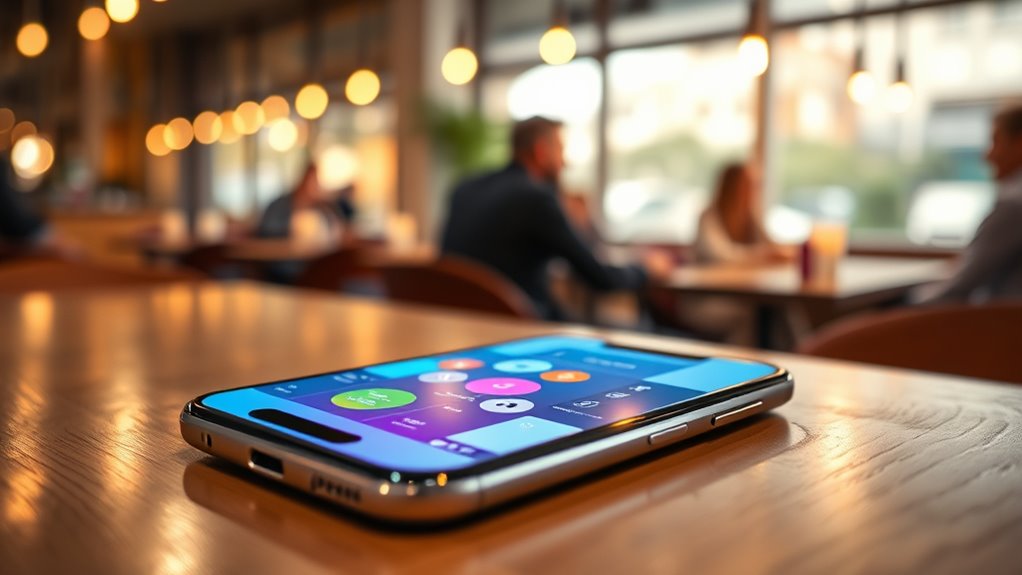AI relationship coaching apps can substantially support your love life by offering personalized insights, improving communication skills, and helping you understand your partner better. They provide a safe, unbiased space to reflect on relationship patterns, identify strengths, and address challenges. While they aren’t a complete fix, they serve as a helpful supplement to foster healthier connections and ongoing growth. Keep exploring, and you’ll discover how these tools can fit into your relationship journey.
Key Takeaways
- AI coaching can improve communication skills and self-awareness, supporting healthier relationship habits over time.
- It offers personalized insights into compatibility, values, and conflict styles, aiding couples in understanding each other better.
- While helpful, AI apps are best as supplements, not replacements for human connection or professional counseling.
- They provide a safe, unbiased space for honest reflection and emotional exploration, fostering empathy and understanding.
- Long-term relationship success still depends on mutual effort, emotional commitment, and sometimes seeking professional guidance.

As technology advances, AI relationship coaching is emerging as a practical tool for couples seeking guidance and support. You might wonder if an app can truly improve your love life, but these tools are designed to analyze patterns and offer personalized insights that can make a real difference. One of the key areas they focus on is understanding romantic compatibility, helping you and your partner determine how well your personalities, values, and long-term goals align. By evaluating factors like communication styles, emotional needs, and even conflict resolution tendencies, AI coaching can give you a clearer picture of your relationship’s strengths and potential challenges.
AI relationship coaching analyzes compatibility factors to reveal strengths and challenges, supporting healthier, more understanding partnerships.
Communication skills are at the heart of any healthy relationship, and AI tools excel at helping you strengthen them. They often include exercises, prompts, and real-time feedback to encourage honest conversations. For example, if you tend to shut down during disagreements or struggle to express your feelings clearly, the app can suggest specific techniques to improve these interactions. It might recommend active listening exercises or ways to phrase your thoughts more constructively. Over time, these prompts help you become more aware of your communication patterns, making it easier to navigate conflicts and deepen your connection.
What makes AI relationship coaching particularly appealing is its accessibility and consistency. Unlike traditional counseling, which can be costly and time-consuming, an app provides continuous support whenever you need it. You can practice communication skills daily, receive tailored advice, and track your progress without scheduling appointments or waiting for sessions. This constant availability allows you to work on improving your relationship at your own pace, making small but meaningful changes that accumulate over time.
Moreover, AI coaching can serve as an impartial listener, offering a safe space for honest reflection. Sometimes, discussing issues with a human can feel intimidating or biased, but an AI doesn’t judge or get emotionally involved. It can highlight areas where your communication might be breaking down or where your romantic compatibility could be enhanced. This objective feedback helps you see your relationship from a new perspective, fostering greater understanding and empathy between you and your partner.
While AI relationship coaching isn’t a cure-all, it can be a valuable supplement to your efforts to build a stronger partnership. By enhancing your communication skills and understanding your romantic compatibility, these apps empower you to take proactive steps toward a healthier, happier relationship. As you engage with the technology, you might find that small adjustments lead to big improvements, helping you and your partner connect more deeply and communicate more effectively every day.
Frequently Asked Questions
How Effective Are AI Coaches Compared to Human Therapists?
AI coaches can be effective for improving emotional intelligence and supporting therapy outcomes, but they often lack the nuanced understanding a human therapist provides. You might find AI helpful for quick advice or emotional tracking, yet complex issues require human empathy and intuition. While AI can supplement therapy, it generally can’t replace the depth of personalized care you get from a trained therapist, especially for deep emotional or relationship challenges.
Can AI Detect Emotional Nuances in Relationships Accurately?
Imagine your emotions as a delicate dance, and AI as the attentive partner trying to follow every step. AI can detect emotional nuances through patterns and tone analysis, but it’s not perfect. Its emotional recognition and nuance detection are improving, yet still lack the depth of human intuition. While AI can pick up on surface signals, it may miss the subtle, unspoken feelings that truly define a relationship.
Are AI Relationship Apps Suitable for All Relationship Types?
AI relationship apps aren’t suitable for all relationship types, especially those needing deeper emotional connection or complex dynamics. They can help with compatibility assessment and suggest communication strategies, but may fall short in addressing unique, nuanced issues. If your relationship involves significant conflict or specific cultural considerations, relying solely on these apps might not be enough. Use them as tools alongside open dialogue and, when needed, professional guidance for the best results.
How Is User Data Protected in AI Coaching Apps?
You can trust that your data is safeguarded in AI coaching apps through strong data encryption, which keeps your personal information secure. Developers prioritize addressing privacy concerns by implementing secure storage and regular security updates. However, always review the app’s privacy policy and settings to ensure your data remains confidential. Staying vigilant helps you enjoy the benefits of AI coaching without compromising your privacy.
Can AI Help Resolve Deep-Seated Trust Issues?
Think of AI as a lighthouse guiding you through stormy seas of trust issues. It can assist with trust recovery and vulnerability building by offering personalized insights and exercises. While it can’t replace deep emotional work, it helps you recognize patterns and build confidence gradually. With consistent effort, AI tools can be a valuable companion in steering and healing your trust wounds, illuminating the path toward healthier relationships.
Conclusion
Ultimately, AI relationship coaching promises a guiding light in the often murky waters of love, but remember, no app can replace the human heart’s unpredictable rhythm. While these tools can illuminate your path, they can’t mend every fracture or ignite genuine connection alone. Like a lighthouse in a storm, they offer direction—but it’s your own courage and authenticity that truly steer your love life toward safe harbor. Will you let technology be your compass or your captain?






